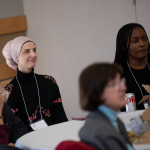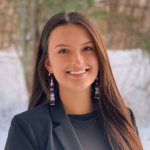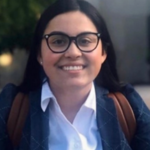Prospective Students
The Gladstein Family Human Rights Institute at the University of Connecticut offers a two-year Master of Arts in Human Rights to advance students’ knowledge of human rights from both academic and professional perspectives; training them to become competitive candidates for positions in a variety of sectors, including industry, government, education, and advocacy.
Our human rights faculty are internationally recognized experts drawn from disciplines across the University of Connecticut and here to share their skills in human rights practice, research, and education. This diversity facilitates students’ study of their particular human rights interest while at the same time broadening their topical and methodological human rights knowledge.
Our two-year 30-credit master’s program consists of 15 core credits and 15 credits of electives, including a 200-hour practicum. This project-based fieldwork is done with an approved partner organization related to the field of human rights and provides students real problem-solving experience related to their career goals.
Student Testimonials

"The program offered interdisciplinary human rights research and practice opportunities, and I was excited to learn from the faculty, My knowledge and experience regarding human rights matters has increased and intensified during my time studying through the M.A. program." - Melissa ‘24

"I was drawn to the interdisciplinary approach and the meaningful influence of the many human rights initiatives at UConn. The program has allowed me to build relevant skills, focus on my particular interests at the intersection of archival work and film, and allowed me to network with experts in the field." - Aida ‘24

"I chose the M.A. Human Rights program to expand my knowledge and ability to support and advocate for human rights in Indigenous communities and beyond. As an Indigenous woman, I sought to develop my research around Indigenous education rights as human rights further and have felt nothing but support, compassion, and mentorship from the faculty and staff at HRI in doing so." - Sage ‘24
Program Requirements
The 30-credit program structure integrates academic coursework on human rights with professional work experience opportunities that enhance applicants' professional portfolios in preparation for the job market. The credits break down as follows:
- 15 Common Core credits
- 15 Elective Credits:
- Minimum of 6 Foundational Elective credits
- 9 additional elective credits drawn from either the Foundational Elective or Supplementary Elective lists.
A complete accounting of all Common Core and Elective credits can be found in the Graduate Catalog.
A list of graduate course offerings for the current academic year can be viewed on our Course Offerings page.
How to Apply
Application Deadline: February 1
Required Application Materials
Applicants are required to submit:
-
- Personal statement (maximum 750 words, 1-inch margins, standard font such as Arial or Times New Roman) that addresses the following questions:
- Why do you want to earn a master’s degree in human rights and what particular topical interests do you have within the human rights field?
- How have your academic training, work/internships, and relevant life experiences prepared you to be successful in this program?
- How will this program further your career goals?
- Writing Sample (Maximum 15 pages, double spaced, 1-inch margins, standard font such as Arial or Times New Roman) that reflects their strongest academic work.
- The writing sample does not need to be an original work developed specifically for the graduate application, but rather a written work submitted for a grade, publication, or other professional purpose.
- The writing sample must be in English
- Resume
- Unofficial transcript
- Two letters of recommendation that speak to the applicant’s academic abilities and commitment to human rights.
- Personal statement (maximum 750 words, 1-inch margins, standard font such as Arial or Times New Roman) that addresses the following questions:
Application Instructions
4+1 Accelerated MA Program
- Access The Graduate School’s application
- Create an account
- Create a new application
- Confirm your personal information
- Click the drop down menu under the question "To which type of program are you applying?"
- Select the "UConn Accelerated UG to Grad" option
- Select your UConn undergraduate student level
- Click Submit
- Open the Pre-Grad or Non-Degree Application you just created
- Click the drop down menu under the "Application Type" header, and select "UConn Accelerated UG to Grad"
- Click the drop down menu under the "Intended Program" header, and select "Human Rights"
2-Year MA Program
- To apply, please access The Graduate School’s application
Costs & Fees
There is a $75.00 application fee required to apply for the program.
In some cases, the Graduate School may provide an application fee waiver. Please review the UConn Graduate School Fee Waiver Policy to see if you qualify.
The tuition and fee schedule for graduate programs can be found on the Bursar’s website.
FAQs
Do I need to take the GRE?
No, GRE scores are not required for program admission.
Do I need to be a human rights major to enroll in the MA in human rights program?
No, you are eligible to apply to the MA program regardless of your undergraduate major.
How many credits count toward both my undergraduate human rights degree and the MA in human rights?
Up to 12 credits (four 3-credit classes) of approved graduate coursework which is included in the student’s undergraduate (BA) plan of study can be used to the MA plan of study.
Does the Human Rights Institute offer graduate assistantships for accepted students?
At this time, HRI is unable to offer financial support in the form of graduate assistantships for students enrolled in the MA program.
Does HRI offer financial support to students completing the human rights practicum?
Yes, we will offer scholarships to support students as they complete the practicum. Information about these scholarships will be made available to students upon admission into the program.
Questions about the masters program or application process? Please contact David Richards or Alyssa Webb .
Resources for Current Students
Graduate Events
Meet Our Graduate Students

Solé Blanks earned a Bachelor of Arts in Political Science from the University of Connecticut, and is currently in the process of obtaining a Master of Arts in Human Rights. Areas of interest include criminal justice reform, prison reform and civil rights. Upon completion of her degree, Solé plans to go on to law school and become a criminal prosecutor.

Ery Caswell is a graduate student in the Human Rights Masters program, and a Student Success & Engagement Librarian, serving as liaison to the Gladstein Family Human Rights Institute at the UConn Library. He holds an MLIS from the University of Rhode Island and a BA in Writing and Politics from Ithaca College, and has studied the intersections of librarianship, activism, and information democracy through the Radical Librarianship Institute at UCLA (2023) and the Library Freedom Institute (2025). Before joining UConn, Ery was a public librarian creating programs that connected people with human and social services, especially in the areas of fair housing and food justice. He is also passionate about facilitating writing groups and community publishing projects as spaces for narrative empowerment and civic dialogue.

Samantha Eldridge is a double major in Human Rights and Political Science with a minor in Spanish, and is in the Accelerated Master's Program in Human Rights. Her academic focus centers on Genocide and Mass Atrocity Prevention, as well as international human rights. She has studied abroad in Costa Rica, where they explored immigration and human rights issues in Central America, and completed an internship in Zagreb, Croatia, gaining firsthand experience with mediation and legal processes in the Balkans. She has also contributed research to James Waller’s forthcoming book on deeply divided societies. Passionate about advancing their understanding of human rights, Samantha is eager to engage with the subject in a deeper and more rigorous context beyond their undergraduate studies.

Mercy John is an incoming student in the Human Rights Program. Her academic background includes a B.A in International Studies and Human Rights Studies with a concentration in Peace and Global Security from the University of Dayton. Mercy has worked at both the corporate and grassroots levels, interning at Counterpart International and Dandelion Africa, a women-led non-profit NGO based in Nakuru, Kenya. As Governance Fellow for Counterpart International, Mercy conducted background research for the regional Human Rights Bid led by the Pan American Development Foundation. As a Dandelion Africa Intern and Researcher, she organized and led in-depth qualitative research on Female Genital Mutilation in the four counties where Dandelion Africa operates. Mercy is interested in environmental human rights and migration, Land Back movements, and anti-FGM initiatives. Upon completion of her degree, Mercy plans to continue working with grassroots human rights organizations.

Nishi Kapoor is a graduate student studying Human Rights. She recently graduated from UConn with a BA in Political Science and Human Rights. Nishi is deeply passionate about advancing the rights of minority and underrepresented groups and has worked firsthand with marginalized communities. Her academic research has focused on children's rights in the U.S., as well as the protection of minority groups. She is excited to deepen her education and commitment to human rights advocacy through the graduate program and contribute in a meaningful way.

B. Diaz


Molly McNulty holds a Bachelor's degree in Film Studies and Genocide Studies from Keene State College in New Hampshire. She is now working towards her Masters in Human Rights with the goal of working in public service or education with a focus on atrocity prevention. She has experience in many facets of education from archiving to non profits to K-8 public education, and is looking forward to joining the UConn Human Rights community!


Stella Sessions (she/her) is a first-year graduate student in the Human Rights program at the University of Connecticut. Sessions plans to study policy analysis and gender-based violence, with an emphasis on sexual violence prevention and systemic reformation. She is a recent graduate from the College of William & Mary, where she received a BA in Public Policy and was involved with VOX: Planned Parenthood Generational Action, advocating for reproductive justice and access for all. Sessions currently serves a Graduate Assistant at the Gladstein Family Human Rights Institute for the CIRIGHTS data project, where she supports data collection and literature analysis.
